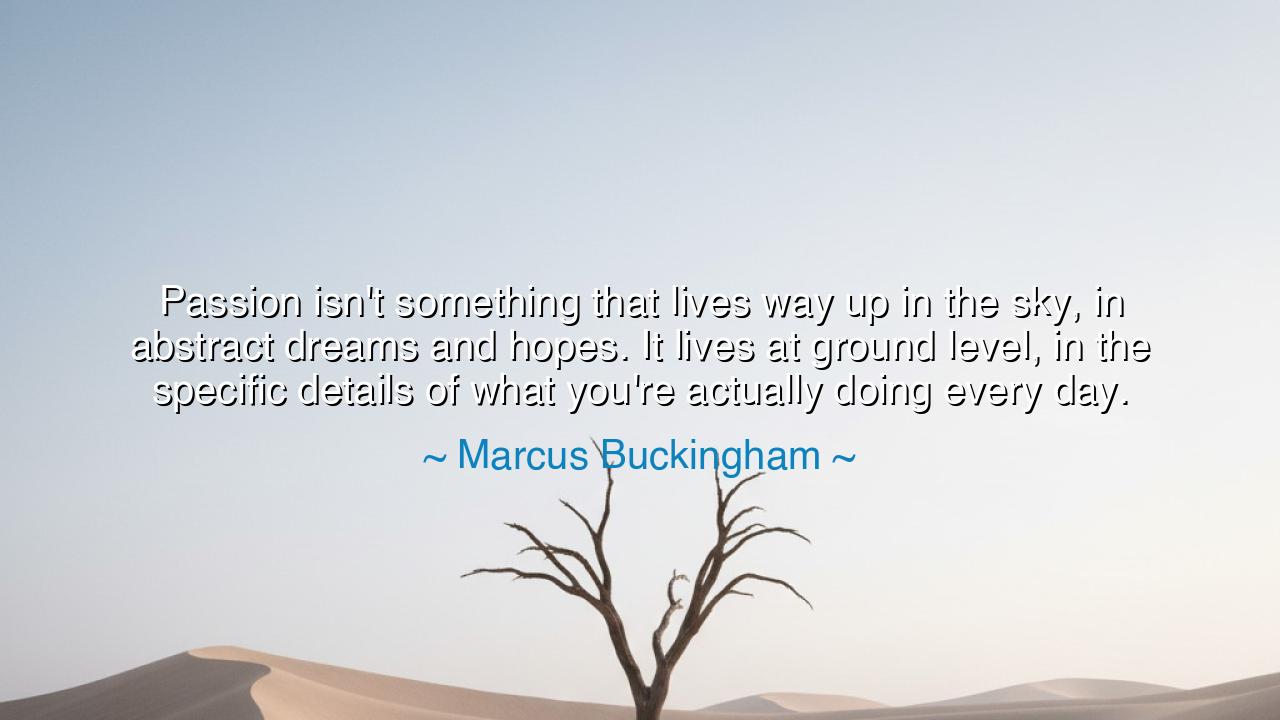
Passion isn't something that lives way up in the sky, in abstract
Passion isn't something that lives way up in the sky, in abstract dreams and hopes. It lives at ground level, in the specific details of what you're actually doing every day.






“Passion isn’t something that lives way up in the sky, in abstract dreams and hopes. It lives at ground level, in the specific details of what you’re actually doing every day.” Thus spoke Marcus Buckingham, a teacher of purpose and work, whose words cut through the mist of illusion to reveal a truth both humble and profound. He reminds us that passion is not a distant flame burning in the heavens of imagination—it is the quiet fire kindled by daily effort, by the love of craft, by the hands and heart laboring in harmony. To seek passion in dreams alone is to chase shadows; to find it in the details of the day is to discover the divine hidden within the ordinary.
In this saying, Buckingham challenges one of the great myths of modern life—the belief that passion is something we must find before we begin, that it descends upon us from above like divine inspiration. He teaches the opposite: that passion is born from action, not from waiting. It is not discovered but cultivated. The poet does not wait for the muse to appear before writing; he writes, and in the act of creation, the muse awakens. The craftsman, the teacher, the healer—all find their passion not in lofty dreams, but in the work of their hands, in the rhythm of their days, in the specific details of what they do with care and purpose.
The ancients knew this truth well. Consider Leonardo da Vinci, that genius of many arts. His life was not a series of grand revelations from on high, but of constant, humble curiosity. He painted, sketched, and studied endlessly—not because he always felt inspired, but because he was faithful to the act of learning itself. In the small, daily observations of flight, water, and anatomy, he uncovered the infinite beauty of the world. His passion lived at ground level, in ink-stained notebooks and sleepless nights. From these details, the grandeur of his genius emerged—not the other way around.
So too must we learn that dreams are seeds, not fruit. A farmer cannot eat the idea of a harvest; he must work the soil. He must sweat, bend his back, and tend his field each morning, believing that the fruit will come. Likewise, passion grows when we engage with our calling—not when we fantasize about it. The specific details—the repetition, the practice, the moments of struggle—these are not the enemies of passion but its birthplace. Without them, dreams remain untouched clouds drifting beyond our reach.
Buckingham’s wisdom also humbles those who wait for the “perfect” job, the “perfect” moment, or the “perfect” feeling before acting. For he knows that the fire of passion rarely ignites in comfort. It is struck by friction—the tension between effort and failure, the slow mastery of skill, the patience to love what one once found dull. To live passionately is not to escape the mundane, but to elevate it. The baker who kneads his dough with care, the teacher who opens young minds, the artist who paints until the light fades—all transform daily labor into sacred expression.
The great violinist Niccolò Paganini once said that the strings of his instrument were his soul’s voice—but what gave them voice was not genius alone; it was discipline. He practiced endlessly, perfecting the minute details of sound and touch. His passion was not a dream but a daily devotion. In every bow stroke and every calloused fingertip, he found the divine. So too must we realize that passion is not a thunderclap—it is a rhythm, beating quietly through every moment of honest work.
Thus, my children of effort and longing, take this truth to heart: if you would live passionately, love the details of what you do. Do not wait for the skies to open or for inspiration to descend like fire. Begin where you stand. Stir your hands in the work before you. Notice the craft, the process, the texture of what fills your hours. For in the smallest acts of attention, the greatest flames are born. Passion is not distant—it is near, waiting to be awakened in the next word you write, the next task you complete, the next step you take in faith.
And so, the lesson is clear: honor the ground beneath your feet. Do not seek passion in dreams alone; seek it in the sacred rhythm of doing. Let each day, however ordinary, be your teacher. In its details you will find meaning; in its practice, joy; and in its perseverance, purpose. For as Marcus Buckingham has said, passion lives not in the sky, but in the soil—and it is only those who work with open hearts and steady hands who will feel its fire.






AAdministratorAdministrator
Welcome, honored guests. Please leave a comment, we will respond soon